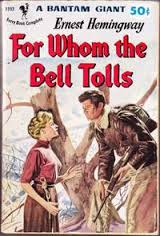
For Whom the Bell Tolls begins and ends in a pine-scented forest, somewhere in Spain. The year is 1937 and the Spanish Civil War is in full swing. Robert Jordan, a demolitions expert attached to the International Brigades, lies "flat on the brown, pine-needled floor of the forest, his chin on his folded arms, and high overhead the wind blew in the tops of the pine trees." The sylvan setting, however, is at sharp odds with the reason Jordan is there: he has come to blow up a bridge on behalf of the antifascist guerrilla forces. He hopes he'll be able to rely on their local leader, Pablo, to help carry out the mission, but upon meeting him, Jordan has his doubts: "I don't like that sadness, he thought. That sadness is bad. That's the sadness they get before they quit or before they betray. That is the sadness that comes before the sell-out." For Pablo, it seems, has had enough of the war. He has amassed for himself a small herd of horses and wants only to stay quietly in the hills and attract as little attention as possible. Jordan's arrival--and his mission--have seriously alarmed him. "I am tired of being hunted. Here we are all right. Now if you blow a bridge here, we will be hunted. If they know we are here and hunt for us with planes, they will find us. If they send Moors to hunt us out, they will find us and we must go. I am tired of all this. You hear?" He turned to Robert Jordan. "What right have you, a foreigner, to come to me and tell me what I must do?" In one short chapter Hemingway lays out the blueprint for what is to come: Jordan's sense of duty versus Pablo's dangerous self-interest and weariness with the war. Complicating matters even more are two members of the guerrilla leader's small band: his "woman" Pilar, and Maria, a young woman whom Pablo rescued from a Republican prison train.

